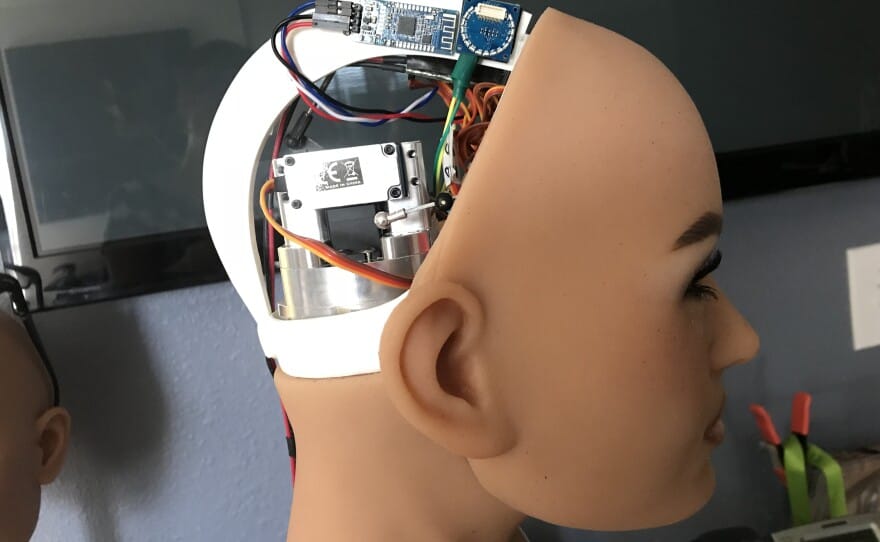TPE Sex Doll Industry Status

The TPE (thermoplastic elastomer) sex doll industry has grown into a multi-billion-dollar market, now valued at over 6.8 billion yuan globally. Once a niche segment, it has evolved rapidly, thanks to technological advances and an increasing demand for realistic craftsmanship. This growth has brought the industry to a pivotal moment, facing both exciting innovations and regulatory challenges. In this article, we’ll dive into the current landscape, the emerging trends driving innovation, and the obstacles that are shaping the future of this unique market.
Market Scale: Steady Growth Fueled by Demand and Global Expansion
The TPE (thermoplastic elastomer) sex doll industry has seen impressive growth in recent years. In 2024, the global market reached approximately 68.1 billion yuan, and it's projected to soar to 118.4 billion yuan by 2031, maintaining a compound annual growth rate (CAGR) of 8.3%. This steady growth is driven by a variety of factors, but the primary catalysts are the unique benefits of TPE material and the expanding demand across different markets.
TPE has become the material of choice for mid-to-high-end sex doll products, thanks to its soft, skin-like texture, impressive elasticity, and ease of production. Compared to traditional silicone dolls, TPE sex dolls offer better cost-efficiency, making them more accessible to individual consumers. Additionally, TPE dolls are a cost-effective option for the growing “shared experience” business model, which allows for communal use of adult products.
From a regional perspective, China plays a pivotal role in the global TPE sex doll market. As both a major producer and consumer, China houses leading manufacturers like WMDoll in Zhongshan, Guangdong. With large-scale production facilities employing over 100 people, these companies export TPE dolls to North America, Europe, Southeast Asia, and beyond.
The surge in demand for TPE sex dolls is also influenced by social trends. In China, gender imbalances (with nearly 30.5 million more men than women as of 2019) have created a demand for ways to address the emotional and physical needs of single individuals. Meanwhile, growing societal acceptance of adult products has paved the way for TPE dolls to be viewed as more than just physical objects—they’re increasingly seen as a way to fulfill emotional needs as well. This shift has led to the rise of new business models, such as adult experience halls, which have further fueled the demand for TPE sex dolls.
Product Innovation: From "Simulation" to "Intelligent Interaction"
The TPE sex doll industry has evolved well beyond just "appearance simulation." Today, technological innovation has become the key factor in distinguishing brands from one another. Product upgrades are now focusing on two major trends: material enhancements and the integration of smart technology.
When it comes to material innovation, top companies like WMDoll are constantly improving their TPE formulas to create a more realistic tactile experience. The latest TPE materials offer smooth, delicate skin surfaces and a soft, elastic texture that closely resembles human skin. These advancements elevate the visual and physical sensations, making the experience feel as lifelike as possible. Manufacturers are also integrating functional features such as breathing effects, movable finger joints, and even vaginal suction mechanisms, which further enhance the realism of the dolls. High-end products now often include customization services, allowing consumers to select everything from height, hair color, and eye color, to skin tone and even facial features, ensuring that the product fits their exact preferences.

The real game-changer, however, is the integration of Artificial Intelligence (AI). Chinese manufacturers, particularly WMDoll, are leading the charge by incorporating AI modules into their TPE dolls. The company’s MetaBox series, for example, connects to cloud computing services through built-in intelligent systems. By using large language models (LLM), these dolls can engage in voice dialogues, respond emotionally, and even process user interactions to create a truly immersive experience. This leap into "intelligent companionship" is transforming TPE dolls from simple adult products into emotional companions, a selling point that’s gaining significant traction in cross-border e-commerce markets.
However, as with any technological advancement, this shift brings its own set of challenges. Issues like data privacy and emotional dependency are being increasingly discussed, raising important ethical questions about AI and its role in the industry. While these innovations are pushing the boundaries of what TPE dolls can offer, the industry now faces the task of balancing technological progress with the responsibility of safeguarding users' emotional well-being.
Industry Dilemma: The "Gray Zone" Between Regulation and Operation
While the TPE sex doll market continues to thrive and technological advancements push the boundaries of what’s possible, the industry still faces significant challenges in terms of regulation and operational standards. One of the most pressing issues is the growing phenomenon of adult experience halls that offer shared TPE dolls.
These experience halls often operate out of discreet locations—high-rise office buildings, apartments, or even hotels—without clear signage. They advertise services under names like "SPA massage" and other euphemisms, attracting customers through online promotions. Customers typically pay by the hour, with some venues even offering "overnight packages" for extended sessions using the dolls. The core issue lies in a complex "triple dilemma" of legality, hygiene, and oversight.
When it comes to legality, the problem is rooted in the existing laws surrounding prostitution, which require the involvement of a human being. Since TPE dolls are not considered “legal persons,” they fall into a regulatory gray area that makes it difficult to impose existing regulations on their use in these settings. From a hygiene perspective, most businesses claim to follow strict sanitation protocols, such as “one customer, one disinfection.” However, undercover investigations have revealed that the cleaning practices often fall short—dolls sometimes have visible dirt left behind, and disinfection procedures are rushed and not thorough. In some cases, businesses use simple disinfectants like Fuyanjie or rely on quick wipe-downs rather than full sanitization, and they are unwilling to share the cleaning process with the public. Experts point out that the folds in the dolls' cavities make it challenging to clean thoroughly, and using low-quality condoms increases the risk of sexually transmitted infections (STIs) spreading between users.
This lack of clear regulation has created a "gray zone" for the industry. The commercial department has stated that there are no clear laws on whether these businesses can legally operate, and the health department has not included these establishments in its licensing criteria, leaving them outside the scope of health regulation. This regulatory void not only puts consumer health at risk but also raises moral concerns. Some argue that these businesses promote obscenity, while others believe they provide a "reasonable outlet for social needs."
As the industry continues to evolve, the need for clear regulations and better oversight is becoming more urgent. Without proper guidance, these businesses and the TPE sex doll industry as a whole may face increasing scrutiny, both from the public and lawmakers.
Future Outlook: Balancing Innovation, Regulation, and Ethics
The TPE sex doll industry has reached a pivotal moment where innovation, regulation, and ethical concerns all collide. To continue growing in a sustainable way, the industry must navigate these challenges carefully, ensuring that technological progress doesn’t outpace responsible regulation and ethical considerations.
Regulatory Needs: Closing the Legal Gaps
One of the most pressing issues is the need for clear regulations. As the industry continues to expand, experts argue that specific laws are needed to address emerging business models like adult experience halls. These regulations should establish clear standards for business qualifications, enforce mandatory disinfection protocols, and define areas where these businesses can operate—ensuring they stay away from schools, residential areas, and other sensitive locations. Additionally, creating standardized safety guidelines for TPE materials and product quality could help prevent health risks from subpar products. Without these regulations, the industry could face mounting legal challenges, putting both consumers and producers at risk.
Self-Regulation: Industry Responsibility
The industry also has a responsibility to regulate itself. Companies should prioritize product safety, ensuring that materials used in the manufacturing process are safe and environmentally friendly. This can be achieved by adopting strict quality control measures and focusing on functional safety. Another area that needs attention is the ethical side of innovation, particularly when it comes to AI-powered dolls. To prevent potential issues like data privacy breaches or excessive emotional attachment, manufacturers should establish ethical guidelines for emotional interaction and set boundaries for AI-driven companionship. An industry-wide ethics committee for AI sex products could be a step in the right direction—one that creates norms around data security and psychological safety for users.
A More Rational and Inclusive Approach
On a societal level, the conversation surrounding TPE dolls and experience halls needs to shift. As Professor Peng Xiaohui, Vice President of the Chinese Sexology Association, pointed out, the existence of TPE dolls reflects real sexual needs in certain segments of the population. Instead of imposing blanket bans, it’s more beneficial to guide the industry with standardized, thoughtful management. This approach could reduce health risks, such as unwanted pregnancies or the spread of STIs, while ensuring that people have access to the products they need in a safe and controlled manner. The key will be a collaborative effort between the government, businesses, and the public, all working together to build a regulatory framework that doesn’t over-regulate or suppress innovation, but instead fosters a balanced and responsible industry.
Final Thoughts
The TPE sex doll industry, with its annual growth rate of 8.3%, has evolved into more than just a profitable business—it's a reflection of changing social needs and the challenges of regulation. The industry’s journey from realistic material simulation to cutting-edge intelligent interaction shows the potential for exciting advancements, while the issues within the adult experience hall sector highlight the urgent need for clearer regulations.
Looking ahead, the future of the TPE sex doll market isn't about flying under the radar and making a quick buck. It’s about stepping into the light with standardized operations and a focus on ethical innovation. By striking a balance between market demand, technological progress, and social responsibility, TPE sex dolls can evolve into a product that’s safe, consensual, and widely accepted. With the right approach, the industry can thrive in the face of growing consumer expectations and regulatory challenges.



